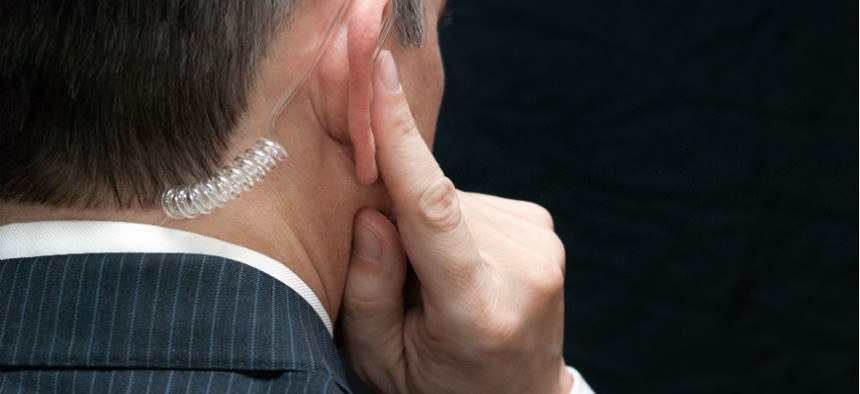
David Stuart Productions / Shutterstock.com
The Secret Service's Problems May Be Older and Harder to Fix Than You Thought
Readers offer solutions that go beyond Pierson's resignation and undoing the DHS merger.
I argued in this column Wednesday that the resignation of Director Julia Pierson wouldn't fix the Secret Service. I urged Congress and the Obama administration to undo a post-9/11 reform that folded the agency into the new and ginormous Homeland Security Department. I barely scratched the surface.
A few well-informed readers tell me that the problems are older and more deeply rooted than anyone wants to admit.
First came a link via Twitter from a reader reminding me about a horrifying U.S News & World Report cover story on the Secret Service in June 2002—almost a year before the DHS merger. It opens with tales of sexual dalliances, theft, and public rowdiness among agents whose conduct defiled the Secret Service's "image to the world of bravery, excellence, and patriotism."
[A] U.S. News investigation shows that, at a time when the stakes for the Secret Service are higher than ever, the agency is rife with problems and resistant to oversight and correction. The troubles range from alcohol abuse and misuse of government property to criminal offenses and allegations of extramarital relationships by Secret Service personnel with White House employees …
Such incidents, current and former Secret Service personnel say, are tarnishing the image of an agency long lionized as the elite of the elite. And they have led many agents to raise questions about their organization's ability to fulfill its unique mission: protecting America's leaders.
Written a dozen years ago, that story documented the occurrence of similar issues in the 1990s. My point:
- Pierson was an ineffective leader who squandered the public's trust, so she had to go. But the problems didn't start with her.
- The Homeland Security Department is a bureaucratic monstrosity that weakens the Secret Service's autonomy and leadership, cannibalizes its budget, and suffocates its sense of purpose. The Secret Service should regain its quasi-independent status. But the problems didn't start with a Bush-era reform.
If only it were so simple. Pushing back on my column, Christian Beckner of the Homeland Security Policy Institute at George Washington University writes:
While the U.S. Secret Service's relationship with DHS headquarters has been far from perfect over the past decade, it would be a mistake to think that a new reorganization will be a fix for the issues that have arisen in recent weeks. Instead, the administration and Congress should focus their attention on addressing a number of smaller but harder issues, including adequacy of budgets, personnel authorities, perceived unfairness in promotion decisions among many employees, training issues, and technology challenges. And above all, they need to closely examine the cultural and organizational issues that contributed to the deception and public misinformation about the recent security incidents. That was unacceptable, and should not be tolerated in any government agency, and particularly in one with such an important role in our federal government.
What else needs to be done? I don't know exactly, but I know what the solutions can't be: small, safe, or incremental. "Radical" is the word that came to me while reading a post sent to me by Andy Priest, an antiterrorism-policy adviser in California who identified a "cycle of stagnation" at the Secret Service. He looks at the agency as you would any institution that was built to address problems of the 19th century: expanded and contorted to respond to challenges of the 20thcentury; and now, not surprisingly, struggling to adapt to the 21st century. In other words, the Secret Service is like so many other public trusts: Banks, schools, unions, newspapers, churches, and political parties—virtually every American institution, except perhaps the military, has suffered a loss of credibility and confidence in the eyes of Americans.
How do you revitalize a Lincoln-era institution? You should read Priest's specific recommendations on the Secret Service here. My twist on his language starts with what he calls "fresh perspective and disruption." Leading members of Congress and the White House must ask themselves, "If we were to start a government from scratch, how would we prevent terrorist attacks, and how would we protect the president?" Ruthless attention to that question would lead to a dramatically different approach to the president's security. It might not involve the DHS—or even the Secret Service.
Second, do less with more. Decades-old mission creep gives the Secret Service responsibility for both investigating financial crimes and protecting the president. The DHS's mission is even more far-flung. Congress and the White House should reimagine a new structure and properly fund it, rather than tweaking the current system and squeezing money from it.
Third, the Secret Service should consider unifying its force to promote cross-training, prevent fatigue, and create a more flexible security force. There is now a bright line between "uniformed" officers and the presidential detail.
Finally, the agency needs a new brand of leadership that is open to criticism, transparent about its mistakes, and dedicated to a clear mission. It needs leaders who are strong enough to lobby Congress for adequate resources, savvy enough to fend off bureaucratic encroachment, and strong enough to say "no" to a restless president playing fast and loose with security protocols, which happens far more often than the public knows.
Priest ends his post with what I consider to be an admonishment to second-guessing politicians and journalists. "Rather than continuing to cite examples of deficiencies, poor leadership, low morale, and a need for change," he writes, "perhaps it is time to take action and effect change." Yes—it's long past time.
(Image via David Stuart Productions / Shutterstock.com)







